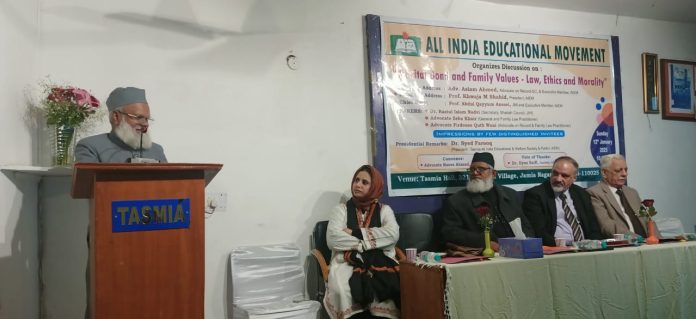New Delhi: At a discussion on Marital Bond and Family Values – Law, Ethics, and Morality, organised by All India Educational Movement here Sunday, legal experts and religious scholars discussed the moral decline in relationships, the importance of Quranic guidance, societal challenges, and potential solutions.
In his inaugural address, Dr. M. Khwaja M Shahid, President, AIEM, highlighted the contrast between joint family system and the emerging prevalence of nuclear families. He emphasised the negative impact of this shift on future generations, particularly in terms of the erosion of family values. He also expressed concern over the rise in live-in relationships, which lack specific legal frameworks and have led to complications, particularly for children born out of such relationships. Dr. Shahid argued that these trends are undermining the foundational concept of family.

Speaking as Chief Guest, Prof. Abdul Qayyum Ansari, an academic from Jamia Millia Islamia and Executive Member of AIEM, emphasised the importance of preserving traditional family systems. He urged the younger generation to turn to religious teachings and Ulama as sources of guidance for building a value-based society.
Dr. Raziul Islam Nadvi, Secretary, Shariah Council, JIH, pointed out the balance between law and morality in Islamic teachings, stating that 80% of guidance is rooted in morality, while 20% pertains to law. He argued that adherence to morality could eliminate the need for legal interventions. Referring to marital disputes, he stressed that if couples adhered to Quranic principles in matters of marriage, relationships, and family, issues such as divorce could be avoided, reducing the need for court involvement.
Drawing from her experience with prolonged divorce cases, Advocate Zeba Khair, Family Law Practitioner, advocated for the establishment of a separate tribunal for divorce cases in India. She emphasised the role of mediation and counselling during disputes and praised Islamic guidance as the most comprehensive approach to marital and family matters. She also urged families and well-wishers to seek solutions based on Quranic and Sunnah principles rather than escalating conflicts.
Advocate Firdouse Qutb Wani, Supreme Court of India, underscored the importance of parenting in fostering a value-based family and society. She questioned whether individuals genuinely follow Islamic guidance in marriages and other relationships, emphasising the need for a commitment to ethical and moral principles.
Dr. Syed Farooq, Patron, AIEM, who presided over the programme, criticised the concept of live-in relationships, likening them to companionship among animals rather than human relationships. He lamented the growing disregard for parental identities in certain Western societies, contrasting it with India’s enduring respect for family systems. He called for love, respect, and empathy as essential tools for preserving family values.
During the programme, a book titled “Muslim Inheritance” by Anwar Alam was released. The programme began with a welcome address by Advocate Aslam Ahmed, Advocate-on-Record at the apex court. Advocate Raees Ahmad, the programme convener, conducted the proceedings, while Ilyas Saify delivered a vote of thanks.




